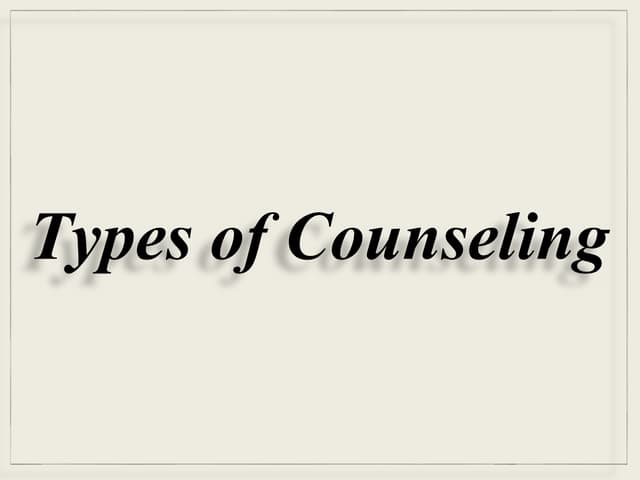A Comprehensive Overview to the Different Sorts Of Therapy and Their Effect
Therapy incorporates a variety of therapeutic methods, each developed to satisfy distinct mental health and wellness requirements. From the structured techniques of Cognitive-Behavioral Therapy to the empathetic nature of Person-Centered Treatment, these techniques supply distinct pathways to personal growth. Household treatment and Dialectical Actions Treatment provide extra frameworks for recovery, while team therapy cultivates area assistance. Understanding these diverse methods can illuminate their profound influence on individual well-being. What remains to be checked out are the ins and outs of each technique.

Comprehending Cognitive-Behavioral Therapy (CBT)
Although many restorative approaches exist, Cognitive-Behavioral Therapy (CBT) attracts attention because of its organized, ambitious nature. This kind of treatment is based upon the property that ideas, sensations, and habits are adjoined, and by transforming adverse idea patterns, people can change their emotional actions and activities. CBT utilizes different methods, such as cognitive restructuring, which assists clients identify and challenge distorted ideas. Behavior activation urges interaction in enjoyable tasks to fight anxiety.
Normally, CBT is a short-term treatment, frequently lasting in between 12 to 20 sessions, making it accessible for those looking for fast results. Its effectiveness has been well-documented in treating stress and anxiety conditions, clinical depression, and other mental health and wellness problems. The therapist's duty is to lead clients through workouts and homework assignments, cultivating self-awareness and advertising long-term coping strategies. This functional strategy encourages individuals to take control of their mental health, ultimately leading to enhanced life fulfillment.
Exploring Person-Centered Therapy
Person-Centered Treatment, developed by Carl Rogers, supplies a contrasting approach to Cognitive-Behavioral Therapy by emphasizing the customer's subjective experience. This restorative model focuses on the person's point of view, cultivating a setting of empathy, genuine positive regard, and authenticity. By allowing customers to discover their sensations and thoughts without judgment, specialists help with individual development and self-discovery.
The core tenet of Person-Centered Therapy is the idea that individuals possess the integral capacity for self-healing and individual growth. In this setting, the specialist functions as a supportive guide as opposed to a directive authority, urging customers to take fee of their own trip. This method is particularly reliable for those coming to grips with issues such as reduced self-esteem, anxiousness, or anxiety, as it empowers them to confront and recognize their feelings. Ultimately, Person-Centered Treatment grows a solid therapeutic partnership, fostering trust and openness essential for meaningful modification.
The Function of Family Members Treatment in Recovery
Family therapy functions as an essential component in the healing procedure for individuals and their connections. This restorative strategy concentrates on boosting interaction, dealing with conflicts, and promoting deeper connections among household members. By addressing dysfunctional dynamics, family members treatment urges each participant to share their thoughts and sensations in a secure environment, promoting understanding and compassion.

The influence of household treatment prolongs past the sessions, as improved connections can cause enhanced emotional health for all included. Overall, family members therapy plays an important role in healing by fostering unity, strength, and common assistance amongst household participants, eventually assisting them toward a healthier, much more fulfilling life with each other.
Unloading Dialectical Behavior Modification (DBT)
Structure on the foundation of restorative approaches that improve emotional wellness, Dialectical Behavior modification (DBT) supplies an organized structure for individuals dealing with extreme feelings and behavioral challenges. Created by Marsha Linehan, DBT incorporates cognitive-behavioral methods with mindfulness methods, aiming to aid customers handle overwhelming sensations and enhance interpersonal effectiveness.
The treatment is specifically useful for those identified with Borderline Personality Problem however is also relevant to an array of other psychological health and wellness issues. virtual therapy. DBT is composed of private treatment sessions and skills training groups, focusing on 4 essential skill collections: mindfulness, distress resistance, emotion policy, and social efficiency
The Advantages of Group Coaching Sessions
While specific therapy provides useful understandings, team counseling sessions provide distinct benefits that can significantly improve the restorative experience. One vital advantage is the feeling of community that arises among individuals. Individuals usually find convenience in sharing their experiences with others facing similar obstacles, fostering a helpful setting that reduces sensations of seclusion.
Group sessions encourage diverse point of views, allowing participants to find out from each other's coping techniques and understandings. This cumulative knowledge can lead to improved analytical capacities and a broader understanding click here of personal issues.
Furthermore, team therapy often advertises responsibility, as members inspire each other to seek their goals and stick to their commitments. Lastly, the cost-effectiveness of group therapy makes it an available alternative for numerous people seeking assistance. Generally, the collaborative nature of team therapy sessions can substantially enrich the healing journey.
Regularly Asked Questions
What Certifications Do Specialists Need to Exercise Therapy?
Therapists normally require an appropriate level in psychology or therapy, along with supervised scientific experience. In addition, they have to acquire suitable licensure or accreditation to practice legitimately, making certain adherence to expert requirements and ethical standards.
Exactly how Do I Choose the Right Kind of Treatment for Me?
Selecting the right type of treatment entails assessing personal demands, checking out various strategies, thinking about therapist specializeds, and seeking referrals. Comprehending individual objectives and preferences can substantially enhance the performance and fulfillment of the therapeutic experience.

Are Online Counseling Procedure as Effective as In-Person Ones?
The performance of on-line therapy sessions contrasted to in-person ones frequently depends upon specific choices and conditions. Research indicates that both approaches can yield favorable end results, though some may discover greater convenience in face-to-face communications.
For How Long Does Counseling Usually Last?

What Should I Expect During My Initial Therapy Session?
During the first counseling session, customers can expect an intro, conversation of their concerns, establishment of objectives, and a review of the counseling process - low cost therapy. This first conference aims to build connection and assurance convenience